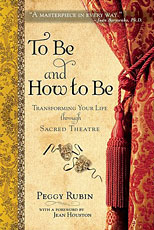"The primary verb is like our bone marrow — the essence that keeps us alive — inspiring us to take the actions that keep us on track with our inmost purpose. This gift that we came with, this truth of who we are, deserves to be presented with élan and verve. Expressing our unique purpose for incarnating is not some awful weight imposed on us against our will but a wondrous means of engaging the world with honor, respect, and happiness. It allows us to offer freely something that only we can provide.
"As I've said, my primary verb is to celebrate. Perhaps yours is to heal, or to dance, or to ponder, or to initiate. One way to know if you're working with the right verb for you is to notice how you feel when you are not doing it. When I'm not celebrating life or learning how to celebrate it more effectively, I feel bored, tired, rootless, stupid. When I forget to celebrate, I struggle, I lose myself, I deny myself.
Supporting Verbs
"Once we're clear about the primary verb, we begin to explore all the other active verbs through which we can satisfy it. All other verbs that describe our actions evolve from this primary one. These include the many verbs we use to learn the most accurate means of expressing our life purpose; the verbs we use to experiment, study, and explore it; and the verbs that give us the greatest joy in fulfilling it.
"If my primary verb were to learn, or, more deeply, to seek, then I would notice all the ways I follow the path of learning — taking classes, finding teachers, writing, reflecting. And I would create a feedback system so that I pay careful attention to those ways of learning and seeking that provide me with the most happiness and engagement. Which classes did I love, which subjects challenged me in good ways? Which helped me to offer my incarnational gift most effectively? Our desire here is to achieve mastery at expressing our primary purpose.
Objects and Adverbs for Focus and Quality
"To the springboard of verbs we add other words: nouns as objects that provide focus and precision for our actions and adverbs that describe the quality of those actions. To use myself as an example again, I have a gift for singing praise and believe that part of my purpose is to provide a sense of joy; these converge in my primary verb to celebrate. I also know that my way to express that verb most effectively is through the springboard it provides for many other verbs: to study, to learn, to seek, to share, to travel, to teach, to perform. These lead me to discovering appropriate objects for celebrating: life, friendship, music, healing, other cultures, and words themselves. When I add adverbs, my Power of Expression becomes stronger: I celebrate life passionately. Then, like a magnificent feedback system, all of these verbs, object nouns, and adverbs give me greater clarity about how best to express my primary verb, and I can see a pathway toward becoming the gift, becoming the purpose. This is my ultimate goal.
"As one's life progresses, the primary verb may shift toward a more precise statement of purpose: in my case, the drive to celebrate moves toward seeking wisdom in order to celebrate life more effectively; and that in turn moves toward learning to love wisdom more deeply in order to celebrate life more truly.
"It is useful to keep your primary verb in the back of your mind at all times. Faced with a daunting, probably boring, series of meetings, if I remember that, 'in this lifetime, I am here to celebrate life, and the most natural way I do that is by learning,' then the task becomes to seek whatever is available for learning, and celebrating, in that meeting. And there will always be something to find. Holding on to the primary verb keeps me aware, awake, and interested.
"If, on the other hand, your primary verb is to heal, your task is to find whatever it is in any scene that needs healing; it may not be visible, but it will be present. Then your choice becomes how best to express your verb in this moment: By touching lightly? Praying silently? Speaking softly?"
